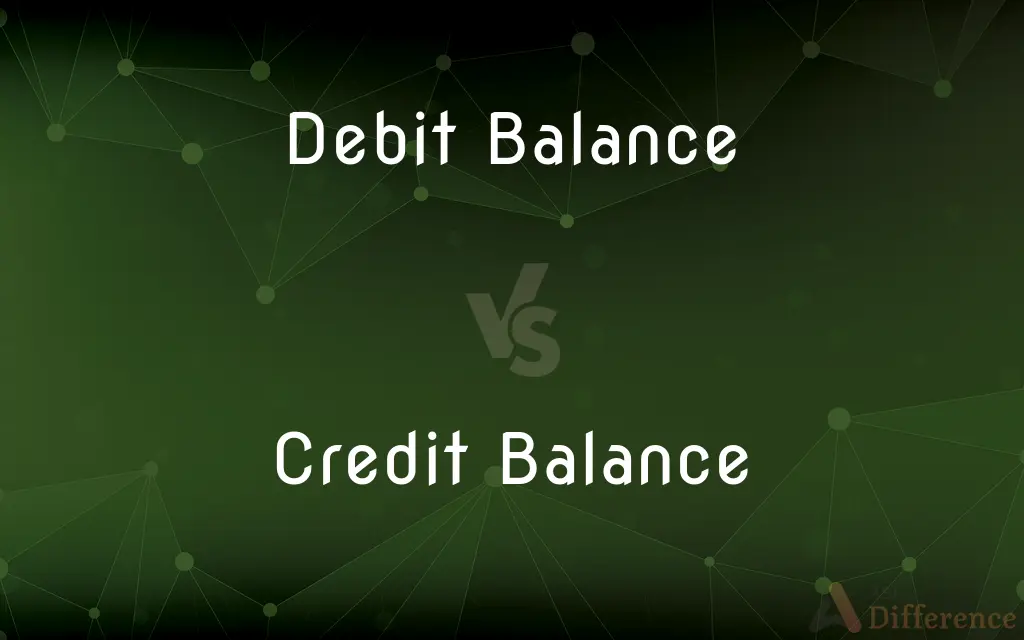Debit Balance vs. Credit Balance — What's the Difference?
By Tayyaba Rehman — Published on January 1, 2024
A debit balance represents the amount owed or an asset, typically in an account, whereas a credit balance indicates the amount credited or a liability, reflecting money that has been lent or is yet to be paid.

Difference Between Debit Balance and Credit Balance
Table of Contents
ADVERTISEMENT
Key Differences
Debit Balance is often an indication of assets or expenses in accounting, reflecting the amount that is owed or has been spent. Credit Balance, conversely, signifies liabilities or revenue, representing the amount credited to an account, often indicating money that is to be received or has been lent out.
In a checking account, a debit balance shows the funds available for withdrawal, essentially the cash a person or business has. In contrast, a credit balance in this context might reflect an overpayment or credits received, such as refunds or deposits, which increase the account balance.
For businesses, a debit balance in accounts like accounts receivable suggests amounts that are yet to be received from customers. Meanwhile, a credit balance in accounts payable indicates the money the business is obligated to pay to suppliers or creditors.
In terms of financial statements, a debit balance on the balance sheet typically represents assets and expenses. On the other hand, a credit balance may appear in equity, liabilities, and revenue accounts, indicating sources of funds or income.
Debit balances are increased by debits and decreased by credits, aligning with the accounting principle of "debit the receiver, credit the giver". Inversely, credit balances are increased by credits and decreased by debits, reflecting the opposite movement in account balances.
ADVERTISEMENT
Comparison Chart
Represents
Assets, Expenses
Liabilities, Revenues
Example in Banking
Funds in a checking account
Overpayment or credits in an account
Business Context
Amounts receivable
Amounts payable
On Financial Statements
Appears in assets and expenses
Appears in liabilities, equity, and revenue
Accounting Movement
Increased by debits, decreased by credits
Increased by credits, decreased by debits
Compare with Definitions
Debit Balance
Debit balance represents the positive balance in a bank account.
Her checking account showed a healthy debit balance after her recent paycheck deposit.
Credit Balance
Credit balance in accounts payable represents the money a business owes.
The company's credit balance with suppliers increased following a large order.
Debit Balance
Debit balance in accounts receivable suggests money owed to the business.
The high debit balance in accounts receivable indicated many customers were yet to pay.
Credit Balance
Credit balance can also imply revenue or income earned but not yet received.
The credit balance in accrued revenue indicated pending payments for services rendered.
Debit Balance
Debit balance can also reflect the cost incurred by a business or individual.
His personal account had a debit balance due to recent large purchases.
Credit Balance
A credit balance signifies the amount of money credited to an account.
After the return was processed, her account showed a credit balance.
Debit Balance
In accounting, a debit balance in an asset account shows the value of assets owned.
The firm's equipment account had a significant debit balance, indicating substantial investments in machinery.
Credit Balance
In banking, a credit balance may indicate an overpayment or surplus funds.
The credit balance in his utility account was due to an overpayment last month.
Debit Balance
A debit balance indicates money spent or owed in an account.
The company's debit balance in its expense account reflected high operational costs.
Credit Balance
On a balance sheet, a credit balance can reflect liabilities or equity.
The firm's credit balance under long-term liabilities showed its borrowing for expansion.
Common Curiosities
Is a debit balance always positive?
Yes, it typically indicates a positive balance or amount owed.
Can a credit balance be negative?
In the context of liabilities, it's positive, but it can appear negative against assets.
How does a debit balance affect a company's cash flow?
A high debit balance can indicate high expenses, affecting cash flow negatively.
Are credit balances common in savings accounts?
Yes, they can reflect the accumulation of savings and interest.
Do debit balances increase with debits?
Yes, debits increase and credits decrease a debit balance.
Can a business operate with a high debit balance?
Yes, but it may indicate high expenses or significant asset investments.
Does a debit balance mean debt?
Not necessarily, it can also represent assets or expenses.
Is a credit balance good for a checking account?
It can be, as it might indicate surplus funds or successful savings.
Do credit balances mean profit for a company?
Not directly, but they can indicate potential revenue or equity.
How does a credit card balance reflect in terms of debit and credit?
A credit card balance is typically a credit balance, representing a liability.
What does a debit balance in accounts payable mean?
It's unusual and may indicate a mistake, as accounts payable should have a credit balance.
Are debit and credit balances important for personal finance?
Yes, they help in understanding financial standing and managing budgets.
Is a debit balance favorable for accounts receivable?
Yes, it indicates money owed to the business, which is an asset.
What happens if a credit balance is too high?
A high credit balance can indicate excessive debt or large revenue not yet received.
Can individuals have credit balances?
Yes, in accounts like overpaid utilities or credit accounts.
Share Your Discovery

Previous Comparison
Research Methods vs. Research Methodology
Next Comparison
Kimball vs. InmonAuthor Spotlight
Written by
Tayyaba RehmanTayyaba Rehman is a distinguished writer, currently serving as a primary contributor to askdifference.com. As a researcher in semantics and etymology, Tayyaba's passion for the complexity of languages and their distinctions has found a perfect home on the platform. Tayyaba delves into the intricacies of language, distinguishing between commonly confused words and phrases, thereby providing clarity for readers worldwide.














































